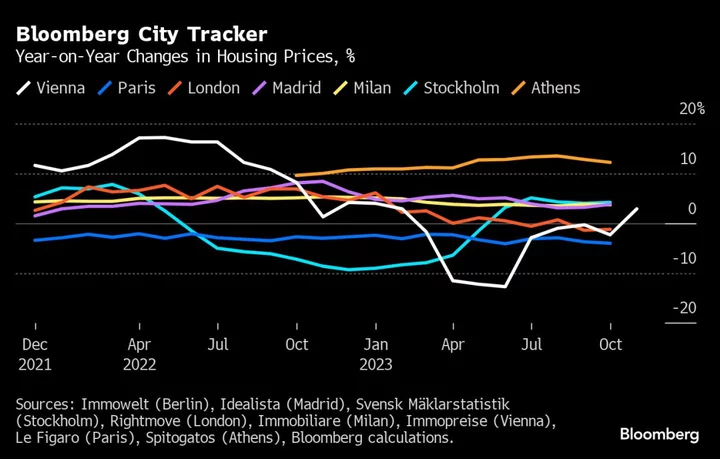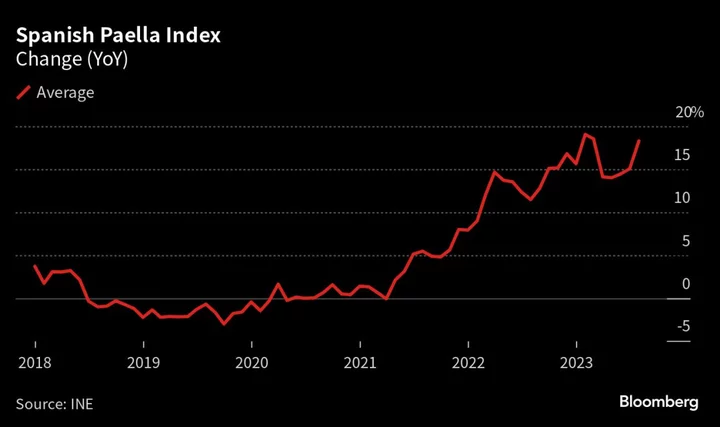Athens has become one of Europe’s hottest housing markets, with apartments in what was once a rundown industrial district now on par with wealthier European cities and luxury developments popping up along its coastline.
Home prices in the Greek capital have climbed 12.2% in October, nearly triple the gains in Stockholm and bucking declines in cities including Paris, according to data compiled by Bloomberg.
The surge has been driven in part by the long, slow fallout of Greece’s debt crisis. Hundreds of thousands of homes are caught up in legal entanglements, thinning the market and driving up prices in Athens faster than any other major European city.
While the end of the cheap-money era has hit buying power across Europe, a lack of housing is gaining the upper hand in more cities. London, Paris and Berlin recorded year-on-year declines in their latest monthly figures, but the bulk of markets monitored by the Bloomberg City Tracker are rising, with Milan, Madrid and Stockholm posting increases of more than 3%.
Click here to subscribe to City Tracker stories.
To capture the latest housing-market trends in European cities, Bloomberg compiles figures from a range of providers. Some are asking rates and indicative levels, while others are official figures on transactions. Athens prices are derived from an index from Spitogatos, which Bloomberg used to calculate monthly asking prices in the five areas of the city and then averaged those levels to create a citywide value.
Greece’s decade-long debt crisis left lenders with €107 billion of soured debt in 2016. Since then, banks have sold bad loans, but with many backed by properties, that collateral has been caught up in efforts to reach payment deals with debtors. While the homes could eventually hit the auction block, the negotiations are squeezing supply in the mean time.
“There are no properties on the market,” said Lefteris Potamianos, president of the real estate association of Athens-Attica, who also attributed the price rise to demand stoked by a Golden Visa program.
On top of the shortage, the economy is recovering and providing locals with more spending power. Greece is forecast to grow faster than the rest of the European Union this year, and per-capita output is seen returning to pre-crisis 2009 levels of more than €21,000 this year — a strong rebound from the low of €16,200 just after the country avoided an exit from the euro-area.
The dynamic has turned areas like Gazi — an aging industrial cluster — into a sought-after neighborhood. With living space in short supply, former warehouses have been converted into lofts around Technopolis — an old gasworks that’s been converted into an industrial museum and exhibition space.
In other parts of Athens like the upscale Glyfada suburb, luxury complexes are popping up to appeal to wealthy overseas investors, especially from China. Work is also finally starting on Ellinikon. The €8 billion redevelopment of the city’s old airport — Greece’s biggest construction project — will feature around 10,000 upmarket beachfront homes and apartments after the first phase is completed in 2026.
Read More: Athens Moves Forward on Transformative Coastline Development
But the building isn’t coming through fast enough to ease the current shortage, and that’s straining consumers. Housing costs ate up more than a third of the disposable income of Greek households last year, compared with the 20% average across the EU.
Prices in the Greek residential property market are set to continue to climb, despite uncertainties in the domestic and global economy, Greece’s central bank said in its financial stability report earlier this month. In the short term, it is estimated that investment interest, mainly from abroad, will remain strong.
This story was produced with the assistance of Bloomberg Automation.
--With assistance from Sotiris Nikas.









